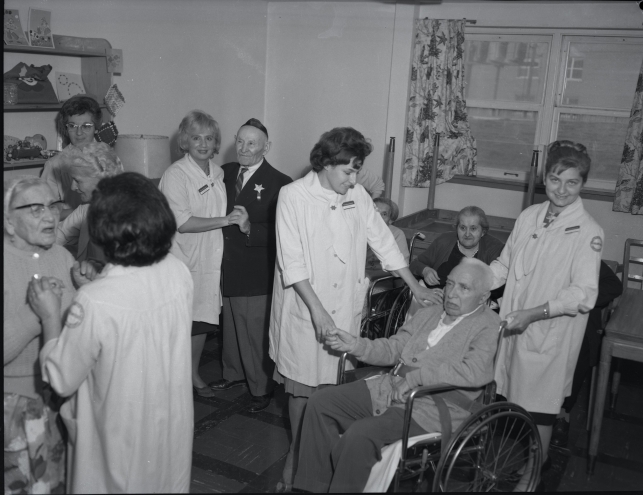Baycrest Centre for Geriatric Care
As early as 1916 the Ezras Noshem Society (a mutual benefit society for Jewish women) started to raise funds to purchase and renovate what would become The Toronto Jewish Old Folks' Home (Baycrest Centre for Geriatric Care’s forerunner) after its members recognized the need for a home in Toronto where the Jewish elderly could receive kosher meals and communicate with staff in their own language. Property at 31 Cecil Street was purchased in 1917 and sometime between September 1918 and January 1920 the Home officially opened there.
The Home was run by a small staff and the women of Ezras Noshem who volunteered their time to make beds, cook kosher meals, do laundry and sponsor fundraising events. By 1938 the Home had expanded into its neighboring houses at 29, 33, and 35 Cecil Street and was caring for 115 residents. It provided residents with synagogue services, a hospital ward and social activities. At this time the Home also became a member of the United Jewish Welfare Fund.
In 1946, the need for a larger and more modern building prompted a fundraising campaign, which was headed by Abe Posluns, to purchase and build a new facility. In December 1954, the new building opened at 3650 Bathurst Street and consisted of two new institutions: The Jewish Home for the Aged and Baycrest Hospital. This location continued to expand over the years, including a new building for residents in 1968, an apartment building for seniors called the Baycrest Terrace in 1976, and a community centre known as The Joseph E. and Minnie Wagman Centre in 1977. These additions enabled Baycrest to expand its programs to include a day care program, recreational programs, and a Sheltered Workshop which was run in cooperation with the Jewish Vocational Service and provided residents with employment. In 1986 a new Baycrest Hospital was erected, and in 1989, the Rotman Research Institute, which is also affiliated with the University of Toronto, opened to create a research facility where top researchers could study and find new treatment methods for the elderly.
In recent years, Baycrest’s services and programs have continued to expand. In 2000, the Apotex Centre, the Jewish Home for the Aged and the Louis and Leah Posluns Centre for Stroke and Cognition opened to help residents with progressive dementia caused by vascular disorders. In 2001 a condominium building opened at 2 Neptune Drive for seniors, and in 2003 the Sam and Ida Ross Memory Clinic was established to provide out-patient services for seniors with memory disorders. Baycrest Centre also provides numerous cultural and religious programs for the inhabitants and the greater community, including a heritage museum, art exhibits and a Holocaust program.
